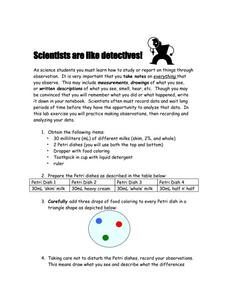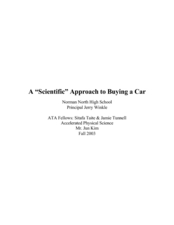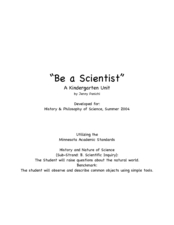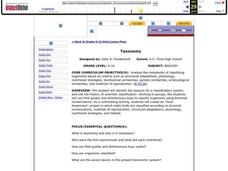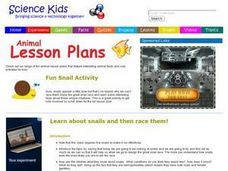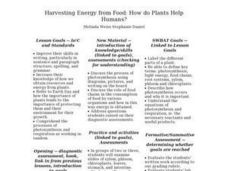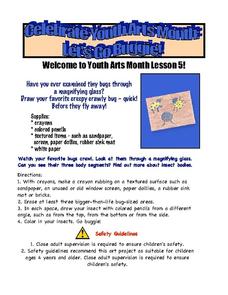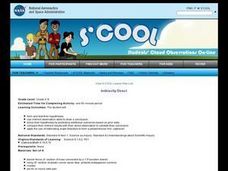Curated OER
Oobleck
Students examine states of matter. In this solids and liquids lesson plan, students conduct a scientific investigation that requires them to make oobleck and record their observations pertaining to it.
Curated OER
Scientist Are Like Detectives
Students demonstrate proper scientific observation skills. For this investigative science lesson, students make observations, record their findings and form conclusions in order to improve their scientific documentation and writing skills.
Curated OER
A “Scientific” Approach to Buying a Car
Young scholars examine what it takes to purchase a car and the resources out there to help find what you are looking for. For this scientific method lesson students complete different problem solving situations.
Curated OER
Creature Feature
Learners make detailed observations and identify an unknown using descriptions. In this observation lesson students are given a creature and must be able to identify it by species and genus.
Curated OER
Be a Scientist: A Kindergarten Unit
Students conduct observations using their five senses. In this science lesson, students describe different states of matter. They investigate the factors affecting mold growth.
Curated OER
Hawaii's Freshwater Ecosystems
Students examine brackish water. In this Science lesson plan, students observe organisms found in brackish water. Students record their observations of the various organisms.
Curated OER
The Nature and Science of Technology
Fifth graders practice using the scientific method by observing and creating mold. In this bacteria lesson, 5th graders experiment creating their own mold and fungus using petri dishes and oatmeal. Students create an...
Curated OER
Crickets Guided Discovery
Sixth graders investigate insect anatomy by analyzing a live cricket. In this insect science lesson, 6th graders discuss their knowledge of insects and describe their characteristics from memory. Students observe live...
Curated OER
Taxonomy
Students analyze the complexity of organism classifications based on certain criteria. In this classifying organisms activity students study taxonomy and gather information and leaves to do their own experiment on...
Curated OER
Learn about snails and then race them!
Students examine snails and make observations about where their eyes are located, how they eat, and how they move. In this snails lesson plan, students discover information about snails by observing them. Students use magnifying glass, a...
Curated OER
What's in Our Woods?
Young scholars observe their local forest and document the change that occurs over the school year. For this forestry lesson, students utilize a GPS to mark a certain area of the woods as their study area for the remainder of the...
Curated OER
Investigating Motion
Students explore types of motion. In this motion experiment, students observe how objects move. Students work in small groups to discover the laws of motion.
Curated OER
Solve the Mystery Photo
Students observe a mystery photo and use descriptive language to solve the mystery. In this descriptive language lesson, students use scientific observation to figure out a mystery photo. Students rationalize their thoughts with...
Curated OER
Harvesting Energy from Food: How do Plants Help Humans?
Beginning botanists view slides of plant vascular tissue. They watch Magic School Bus Gets Planted, which you can find online, and then write a summary of what they have learned about plants. This lesson plan could be used with upper...
Pulitzer Center
Extractive Industries
Here is a chance for environmental studies classes to take a critical look at crises occurring around the globe by reading articles and viewing video clips. The human activities under scrutiny are the extraction of oil, logging, and...
Curated OER
Water Cycle Reading and Writing
Here is a great way to get pupils to express a scientific concept in a fun way. After hearing the story of Walter the Water drop and learning facts about the water cycle, the class will write a creative expository piece describing what...
Arts & Humanities
Let's Go Buggie!
To celebrate art youth month, little ones get out the magnifying glasses and get close-up with bugs. They make scientific observations of bugs you bring into the classroom. Then, they use markers, clay, paint, or crayons to make artistic...
Curated OER
Indirectly Direct
Students use prior knowledge of angle and lines as they conduct an experiment with a rolling marble to determine the shape of a mystery object located under a metal pie tin.
Curated OER
Engaging Young Scientists with Inquiry: Part One
Building inquiry into your science lessons will make science concepts more concrete for your class.
Curated OER
Regents High School Examination: Living Environment 2003
The living environment, from the interior of a cell to the complex relationships among populations, are queried in this final examination. Learners look at air pollution maps, diagrams of cells, population graphs, and drawing of cells....
American Chemical Society
Surface Tension
A drop of dew holds a sphere shape even when sitting on a seat thanks to the surface tension of water. Learners observe the phenomena of surface tension in water. Through demonstrations, hands-on activities, and discussions they explore...
American Chemical Society
Density: Sink and Float for Liquids
We don't think of liquids as floating typically, but a quick look at any oil spill tells a different story. Lesson explores various densities of liquids and why this fact is important. After observing the density variation, scholars...
Virginia Department of Education
Charles’ Law
Searching for a relatively interesting way to demonstrate Charles' Law? Here is a lesson in which pupils heat air inside a flask and then cool the flask to quickly cool the air. They make observations about what occurs during the...
Curated OER
Habitat Basics
First graders get out and explore two different habitats to examine how each one meets the needs of the plants and animals that dwell there. They discuss what they've learned about animal habitats as they explore the outdoor environment....

